
We have compiled a list of several reliable online scam fighting agencies to help you keep up to date on current and past medical alert scams and its types.


Common Medicare Scams :
- Medicare open enrollment scam
- Medical discount scams
- Medical identity theft
- Grandparent scam
In the year 2015, from October 15 to December 7 is considered the Medicare Open Enrollment period. During this time, comparisons are made between medical plans and changes are made. Scammers take full advantage of this time targeting elderly people. They make cold calls claiming to be from medical companies asking your Medicare number to update your account or to send Medicare benefit information or to send "free" medical supplies. Remember, it's a scam!
There are companies who provide legitimate discount plans and there are dishonest marketers who try to sell their plans and take huge amounts from people. The question that should arise before signing up for these discount plans is, "whether they are actually providing money saving benefits or not". In certain scenario, the amount of enrollment and monthly renewal and premium fees charged by them is considerably equivalent to the percentage of discount provided by them.
Always insist on having a written copy of the plan and confirm with your doctor if these medical discount plans are approved by them. Legitimate marketers will send you a written copy along with the plans' terms and conditions. Do not be in a hurry to sign up for any discount plan just because it uses the term "discount". Recently, an increase in number of fraudulent "medical discount cards" from misleading providers is being reported.
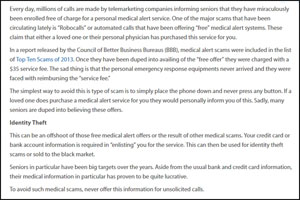
This occurs when a thief uses your name, Medicare number, health insurance number to make fake claims with your insurance provider or to obtain drugs. The damage caused cannot be undone and can be harmful to your life if wrong information is recorded in your medical records.
Therefore, the name of the provider, period and terms of service, detailed Medicare summary should be obtained and verified through independent sources. Few signs of medical identity theft are: denial of providing a bill of medical services, a call saying you have exceeded your benefit limit and receiving a notice of a credit report you don't recognize.
Emotional seniors in particular are targeted in such scams. The scam begins with your grandparent receiving a phone call saying your grandchild has met with an accident, usually outside their reach, and will end up with a desperate request to transfer money. Such scams can be avoided by educating grandparents about sophisticated techniques used by these criminals.
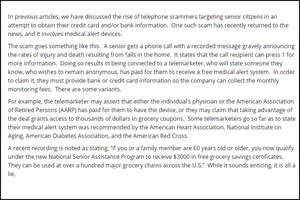
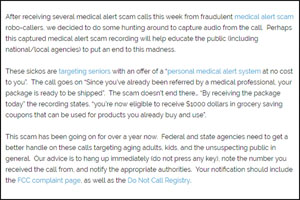
Examples of Medical Alert Scams :
1. Jack Hobbs of Kansas and Stuart Radmall of Utah warning others of several medical alert robocalls received by them.
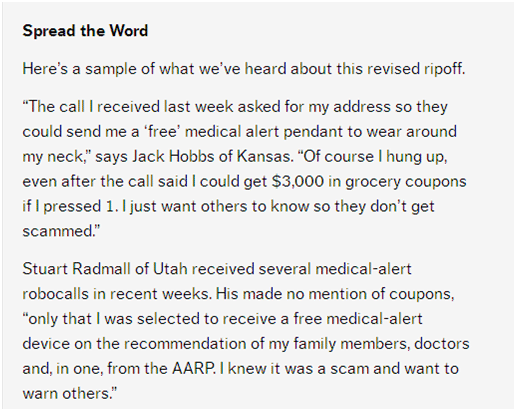
2. In November 2014, FTC was reported about seniors getting conned by robocalls offering them free medical alert devices. They were scammed for their medical alert devices and were asked to pay huge monthly fees. The total scam reported was for $23 million. FTC said the judgement will be suspended if the defendants handed over all the available cash, boat, etc.
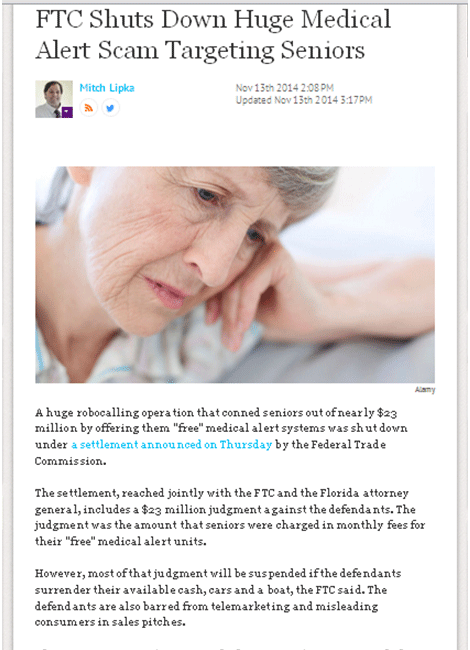
3. A person, on the receiving end, complaining about robocalls harassing her, her sister and her friends.
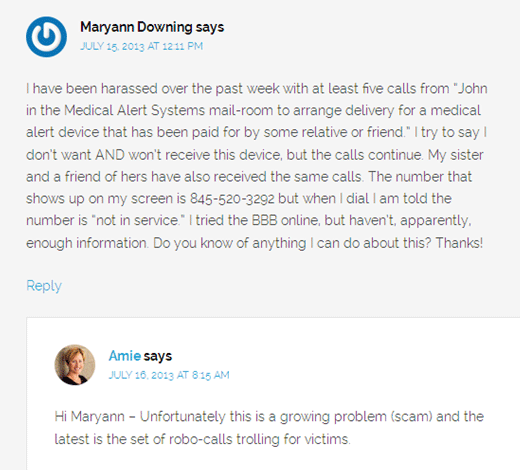
Tips for protecting yourself :
On receiving a call which does not seem to be from a legitimate company,
- Feel free to hang up the call giving unrequested offers.
- Given that you are receiving calls on your landline, check your caller ID and avoid attending calls from unfamiliar numbers.
- Don't pay for anything you didn't ask for. In a variant case, the scammer may call and claim that the device has already been ordered from your side and may ask you to fix an appointment to receive the delivery of the device. These callers never mention a specific brand or company, which is an immediate red flag.
- Be cautious about words like "this offer is valid only for today!" or "limited period offer!" Use of such phrase calls for immediate action.
- Don't give any information to the caller. Ask them to mail you the information or hang up and call back the organization's number they claim to be calling from and check their details.
- Register your number with 'Do Not Call' Registry. It will not completely stop unsolicited calls but will filter many.
- Report such scam calls to your state's attorney general office and to the local police department providing them with the caller details such as name, time and date of call, company name used, the phone numbers used to contact you.
A case on Medical Alert Scam :
U.S district Court, on request of Federal Trade Commission and the Office of the Attorney General of Florida has suspended the operations of an Orlando based company that used robocalls to sell their false "free" medical alert devices to senior citizens. After investigation, the court froze the assets of these agencies for their unfair trade practices.

We are providing the Spam Checker Tool for your convenience. Here you can enter the email or the contact number that you suspect to be a scam. This tool checks it with our spam database list and ensures you regarding the email or the phone number is real one or the bogus.
If you are a victim of Ghana fraud submit the scammer's details here
